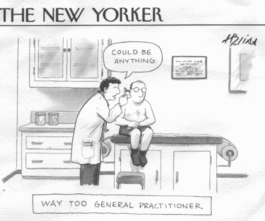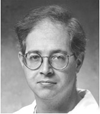Of all impaired physician issues,
incompetence is the toughest to manage. The "dry lab" component of
competence is obvious; required didactic certifications must be
maintained, CME's must be completed, licenses must be active, minimum
case numbers must be documented. The problem arises in the crucible of
clinical practice. Like everything in life, physician competence
resides on a continuum, from inspiring to
notorious. Competence changes
with time; sickness or senescence, improvement with experience or
intercurrent training, and importantly, shifting standard of care. To
make matters more difficult,  competence can be contextual; I might be
an outstanding neuro-vascular anesthesiologist, but weak with liver
transplantation. So, how to judge?
competence can be contextual; I might be
an outstanding neuro-vascular anesthesiologist, but weak with liver
transplantation. So, how to judge?
The answer is outcomes. As in evidence based medicine, good outcomes are the proof of good practice. Competence is generally considered adequate from an institutional and leadership perspective if bad outcomes don't "fall out" in Quality Assurance activity. There are sentinel events (major complications) or patterns of lesser complications that serve to focus leadership scrutiny on the affected practitioner. Here is a situation where once again, insight is key.
An insightful, concerned practitioner will welcome other colleagues' suggestions and ideas, and the discussion that ensues as they jointly review the case will illuminate the affected practitioner's cognitive capacity with respect to the clinical situation at hand. A certain defensiveness is to be expected, but insight-impaired clinicians show a shocking inclination to point fingers rather than engage in introspection, which is obvious to even beginning physician leaders. Incidentally, I try to include as many junior leaders in these processes as possible; like everything else, medical staff leadership is a learned skill.
I have sometimes been asked by affected practitioners to review allegations against them at outside institutions. In most of those instances, it has been possible to define where the problem lies, and most usually, it involves mis-judgments in situations where the practitioner is over-reaching his experiential base. At some point in practice, judgment becomes primarily emotional. As a journeyman, I am not likely to get in trouble if I don't do procedures that make me uncomfortable or nervous-that may seem obvious, but anxiety and stress are common characteristics of the hospital environment, and ego (and professional fees!) can sometimes lead a clinician to stretch past his competence level. Too, in training, discomfort and anxiety are the rule, but that is a supervised situation. Once out in practice, these emotional cues are good signals that competence boundaries are being breached.
This is also true of aging practitioners. Most physicians' self image in large part revolves around their professional role; you can't be called "doctor" all your life and give it up easily. Complex cases which were once a journeyman clinician's daily fare become problematic for some aging doctors, as they lose touch with current practice and lose track of criticial details.On more than one occasion MECs with which I have been involved have gradually transitioned aging practitioners to retirement over years by progressively limiting the scope of their practice to less technically demanding cases, and to require consultant "participation" in their inpatient care.
Competence standards can shift seismically underneath the feet of an otherwise competent physician in two ways; first, technique can change, and second, higher level practitioners can enter the market. Two decades ago, the introduction of laparoscopic general surgical techniques resulted in stress for a whole generation of very senior surgeons, as they were progressively pushed to demonstrate competence in laparoscopy. Despite the obvious improvements in post-op pulmonary function and length of stay, a few surgeons held out for years rather than learn the techniques. One threatened to sue if his privileges to do open cholecystectomies were taken away; a difficult situation, since all general surgeons have privileges to do open "choles"; they just don't do them as first line surgical therapy. In the meantime, there were pockets of trusting patients who consented to, and underwent, elective open cholecystectomies and the relative increased morbidity, knowing no better. To make matters more confused, there was a transition time when having an experienced surgeon perform an open chole was probably preferable to having a recently trained surgeon perform his first or second lap chole. Aggravated docsurg has discussed competence and credentialing, and Sid Schwab frequently muses on these issues in the excellent Surgeonsblog as well.
Competence standards shift when new subspecialists move into town; thirty years ago, general surgeons displaced family practitioners in the operating room. Fifteen years ago, pediatric surgeons displaced general surgeons. (and pediatric and cardiac anesthesiologists displaced generalists) None of these transitions was accomplished gracefully. Kicking and screaming was the general rule, with the trump card being played by...the medical-legal system.
I am especially interested in National Transportation Board disaster investigations; even single pilot/single engine plane crashes rate a visit from an NTSB investigator to review and assess. I was raised as an anesthesia resident to use NTSB crash reports in a metaphorical way to inform anesthesia practice; I wonder why (besides cost) such oversight does not exist for true sentinel events in hospital care. Perhaps it is because they are considered to be individual errors; experience suggests otherwise; sentinel events almost always involve failures of the care system. Aggravated docsurg mildly disparaged the commercial air transport metaphor for the OR, but I'm not so sure the comparison is inapt, at least from the anesthesia end. Both involve complex systems and multiple participants, each of whom must do their job correctly and communicate effectively for the enterprise to be successful.
Amazingly, no regulatory oversight exists for hospital outcomes; we barely make outcomes publicly available so that the market can "decide." Having no oversight is like not investigating commercial aviation accidents, arguing that it should be up to consumers to simply not fly on United or Delta if they didn't think it was safe based on media reports! (which are not available anyway!) When I say there is no outcomes based regulatory oversight, I mean it; the Joint commission comes to make sure histories and physicals are signed, and that fire extinguishers are inspected, but a hospital could receive accreditation with a 30% surgical infection rate, as long as it was properly documented!
Psychiatric impairment is a knotty issue. While there is a legal requirement to accommodate persons with disabilities, I don't believe anybody (save the occasional affected practitioner) believes that this applies to accommodating behaviors that threaten patient well being. The question of when a psychiatrically afflicted practitioner is fit to practice is another matter. In my experience, a physician's personal therapist or psychiatrist is an advocate for his patient/client, and not the hospital and its patients. In these cases, I have always recommended that the hospital retain the services of paid outside consultants to evaluate and advise. (Likewise when there are only one or two qualified practitioners in a given specialty, and the question of competitive bias is raised) Sometimes the hospital administration has taken this advice; sometimes not. In my experience, when the hospitals don't do this, outcomes have not proven satisfactory (penny wise and pound foolish, I'd say.)
I have yet to cover administrative issues pertaining to affected practitioners; I'll do so in a near-future post.
 Mitch Keamy is an anesthesiologist in Las Vegas Nevada
Mitch Keamy is an anesthesiologist in Las Vegas Nevada
 Andy Kofke is a Professor of Neuro-anesthesiology and Critical Care at the University of Pennslvania
Andy Kofke is a Professor of Neuro-anesthesiology and Critical Care at the University of Pennslvania
 Mike O'Connor is Professor of Anesthesiology and Critical Care at the University of Chicago
Mike O'Connor is Professor of Anesthesiology and Critical Care at the University of Chicago
 Rob Dean is a cardiac anesthesiologist in Grand Rapids Michigan, with extensive experience in O.R. administration.
Rob Dean is a cardiac anesthesiologist in Grand Rapids Michigan, with extensive experience in O.R. administration.
Hi,
Like your blog but why don’t you guys address some real issues?
Our field has become a complete s---hole.
I just finished an epidural on a delightful patient. In the room, hooked to hospital’s TV was a video gaming system, unlike anything I had ever seen. Had to have been hundreds or thousands of dollars. Beside that was a DVD player that was somehow integrated into the system, so I suppose when Mommy and boyfriend had finished gaming, they could watch one of the eleven DVDs that I counted on the bedside stand.
Also on the stand sat some type of Sony video camera, poised for action. It was tiny, a trait I associated with cost and had stacked beside it some equally miniaturized tapes, I assume to memorialize the blessed event.
Nestled next to this were two what appeared to be TREO phones.
There was a Coach purse on a little ledge, next to the window and beside it was a large Coach overnight bag.
Mommy had by my count, at least 7 very intricate, ornate tattoos which I learned after a quick on-line review, prior to my writing this note, cost in this area, anywhere from $150-$300 per hour of application.
I hope and pray that for all of these goodies, Mommy and Daddy had financial assistance, maybe Gameacaid, DVDacaid, Phoneacaid, Coachacaid and Tattooacaid.
Fortunately for me and my practice, they did have Medicaid, as their sad life circumstances have rendered them among the unfortunate uninsureds in our populace and with the trappings of poverty, so obvious in the patient’s room I left, after successful epidural placement feeling warm and fuzzy that I was able to help this patient avoid the pain of childbirth and delighted and thankful that I would be receiving, at some point, almost $200 from Medicaid for my efforts.
If I am ever asked again why I went into Anesthesiology, I’ll have to frankly say I don’t know why but I would be pretty clear that I would never, ever advise a family member or friend to do likewise. I count the days, unfortunately, quite a few yet to go, when I can get the f--- out.
Posted by: Frustrated beyond tolerance | August 26, 2024 at 09:28 AM
So, where to begin? First, you will find in O'Connor's posts a fair discussion of politico-economic factors in healthcare. You also might look under SIGNIFICANT POSTS (left sidebar) for a nice link to the recent issue of physician income; Sid Schwab (Surgeonsblog) also addresses this matter on a more personal level. As well, Kevin MD in the last month has spent significant time dredging the net for physician-economic related issues. For the philosophical approach, I can best recommend the author of "Logical Positivism" Ayn Rand; her philosophy is most entertainingly illustrated in Atlas Shrugged. Her notion is that no act of charity will go unexploited. What you did in placing an epidural for virtually no compensation, was an act of charity, which was exploited by "The State" and by the patient. So don't do it! But you say, "if I don't do it, I'll be fired." And you'd be right. SO you say, "Let's none of us do it!" And I remind you of the Reagan era air traffic controllers, who did exactly that; and were crushed by a so called "free market" republican president. Yup, it sucks, because it's not, (and cannot be) a true free market. By the way, last time medicine was a true free market (the fifties maybe) doctors drove beater fords on house calls; the free market was never very good to any but a few entrepreneurial docs. As NHS blog doc, O'Connor, and countless others point out, a centrally controlled system will be lethally inefficient, and I expect the doctors to get ground up like hamburger in the process. You would like "blog of bleeding heart." a disillusioned Canadian anesthesiologist; go read his stuff, too.
Personally, I choose what I write for my own satisfaction; I am not paid to do this, and I spent decades toiling in medical politics at the state and Federal level to try to stem the inequities you are justly outraged over. But I don't write about that now, because so many others do. And because it just makes me sad, or angry, or both.
"Anger cannot be dishonest." Marcus Aurelius
Yes, your anger is just. However, you won't make it through a productive, satisfied life resenting what you are doing; there are no do-overs, trust me. I am surrounded by the shells of men whose anger has eaten them out to emptiness from within. Don't allow this to be your fate. If you go back through my posts, you will find that the general theme is using mindfulness to find "Strength for the Journey."
Thanks for reading; let me close with two more Aurelius Quotes"
"When thou art above measure angry, bethink thee how momentary is man's life."
"Nothing has such power to broaden the mind as the ability to investigate systematically and truly all that comes under thy observation in life."
cheers
Mitch
Posted by: mkeamy | August 26, 2024 at 11:33 AM
A comment for Mitch:
My colleague Richard Cook has attempted to replicate the NTSB methodology for understanding medical accidents. The project is called MEDCAS. I have been a peripheral participant (at most). He is in the process of drafting the report for Phase II, which will be posted on the lab's website. We are also seeking funding to continue the project. Like many great ideas, the only real question is: Who should pay for this?
http://www.ctlab.org/
As a biased participant in many of the lab's activities, I would encourage all interested parties to visit the site and rummage around.
For Frustrated beyond tolerance:
Life is hard.....
I'm a stoic. Getting angry over things beyond my control is complete waste of my time. Better to laugh at the irony than kick the dog.
"From the sublime to the ridiculous is but a step" - Napoleon
In many instances, US healthcare is well beyond a step into the ridiculous. This is self-evident to almost all of its participants. Finding that line in some fair and equitable way is way, way harder than it first appears. Weary pratitioners should fear not: outsiders, most of them politicians, have all of the answers.
Your frustration is the same felt by everyone in medicine who is compelled by circumstance to provide a high level of service for minimal compensation at an ungodly hour and in adverse circumstances. For those outsiders who care, it is the combination of the compulsion to do this AND completely unacceptable compensation that so irks so many practitioners. Be certain: when you make a lawyer or an accountant do this, the bill hurts you more than you hurt them. Plumbers practice this, and deserve the handsome income it renders them. Of course, cast this way, it is clear that in many instances, no amount of money would procure the necessary service: hence the compulsion. Resentment like this is both human nature and nearly ubiquitous in the US healthcare system (or at least those parts of it where care is compelled).
How would things be different if functioning plumbing were considered a right? Or if there was a standard of plumbing? Or if there was an established plumber-customer relationship?
But enough talk about cosmetic surgery....
Me, I'm very happy with the deal I've been dealt thus far. Of course, I had low expectations. I understood that poor compensation, ingratitude, hostile work environment, etc... were all part of the landscape. If I don't like it, I can always make a change. As Mitch suggests, don't let anger or frustration eat you out from within..... learn to laugh at the ridiculous or get out.
Posted by: Mike O'Connor | August 27, 2024 at 02:47 PM
Mitch, Thank you for your comment on my blog and the opportunity to read yours. Excellent content and subject of discussion. Glad you and your colleagues are contributing. You're very much on target with your comments you left me. The relationship between a patient and a physician is a covenent of the highest order but the current climate of the "business of healthcare" also requires this relationship to also be a contractual one as well. Acknowledging, and addressing both of these relationships simulataneously is important... and I'd appreciate the "dual-agency" information... I haven't read about that. Maybe that's why I drive a Honda! Tray...
Posted by: Tray Dunaway, MD | September 04, 2024 at 01:41 PM
For frustrated beyond tolerance:
I believe in personal responsibility. That said, we also live in a society which creates so many opportunities for irresponsible behavior.
The medicaid patient you describe who owns thousands worth of portable electronics on poverty level income is behaving irresponsibly-and harming herself in the process. Her poor financial choices are likely condemning her and, sadly, her children to a life of handouts for years to come, and ensuring that her life- status will not improve much.
But as physicians, are we not morally bound to provide our best care to our patients, and do so in non-judgemental fashion ?
While its true medicare/medicaid does not pay anesthesiologists terribly well for our time and skill, you won't find many of us in this country either private or academic, who aren't well compensated.
Beyond that, and in spite of all the crap we deal with...... we are in the enviable position to ease pain and suffering to an extent greater than any of our physician colleagues - what a privelege!
As I read your post, I heard the words of an individual who seems to have adopted an attitude leading toward burnout - which all to often brings with it depression, marital discord, substance use.......not a good path.
Recall "life is short, the art long" ; our time spent as physicians is a tremendous privelege and awfully fleeting; try to rediscover the passion that got you through training in the first place, and if you can't find it again on you own - seek out someone who might be able to help you.
A concerned colleague.
Posted by: Paul Soccio | April 01, 2024 at 12:24 PM
To Paul:
wise words, I think
Mitch
Posted by: Mitch Keamy | April 01, 2024 at 07:49 PM
I like ANMJ on FB & just subscribed to the email feed! :)
Posted by: Belstaff Blouson Jacket | March 06, 2024 at 03:07 AM